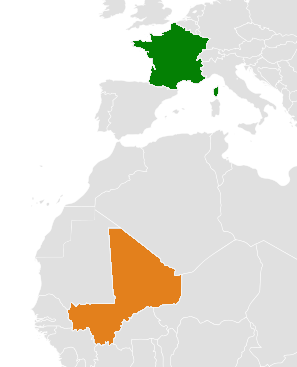
Mali, officially the Republic of Mali, is a landlocked country in West Africa. It is the eighth-largest country in Africa, with an area of over 1,240,192 square kilometres (478,841 sq mi). The country is bordered to the north by Algeria, to the east by Niger, to the northwest by Mauritania, to the south by Burkina Faso and Ivory Coast, and to the west by Guinea and Senegal. The population of Mali is 24,478,595, 47.19% of which are estimated to be under the age of 15 in 2024. Its capital and largest city is Bamako. The country has 13 official languages, of which Bambara is the most commonly spoken.

The Mali Empire was an empire in West Africa from c. 1226 to 1670. The empire was founded by Sundiata Keita and became renowned for the wealth of its rulers, especially Mansa Musa. At its peak, Mali was the largest empire in West Africa, widely influencing the culture of the region through the spread of its language, laws, and customs.

In Abrahamic religions, forbidden fruit is a name given to the fruit growing in the Garden of Eden which God commands mankind not to eat. In the biblical story, Adam and Eve eat the fruit from the tree of the knowledge of good and evil and are exiled from Eden:
And the Lord God commanded the man, saying, Of every tree of the garden thou mayest freely eat:
But of the tree of the knowledge of good and evil, thou shalt not eat of it: for in the day that thou eatest thereof thou shalt surely die.
The Mali national football team represents Mali in men's international football and is governed by the Malian Football Federation. The team's nickname is Les Aigles. They represent the country at tournaments organized by both FIFA and the Confederation of African Football (CAF).

Azawad, or Azawagh, was a short-lived unrecognised state lasting between 2012 and 2013. Azawagh (Azawaɣ) is the generic Tuareg Berber name for all Tuareg Berber areas, especially the northern half of Mali and northern and western Niger. The Azawadi declaration of independence was declared unilaterally by the National Movement for the Liberation of Azawad (MNLA) in 2012, after a Tuareg rebellion drove the Malian Armed Forces from the region.

Amadou & Mariam are a musical duo from Mali, composed of the Bamako-born couple Amadou Bagayoko and Mariam Doumbia (vocals).

Louis Alexandre Auguste Chevrolat was a French entomologist. He specialized mainly on the beetles and was a founder of the Societe entomologique de France in 1832.
Chudeau's spiny mouse is a species of rodent in the family Muridae found in Algeria, Mali, Mauritania, Morocco, and Niger. Its natural habitats are rocky areas and hot deserts.
Paul Mabille was a French naturalist mainly interested in Lepidoptera and botany.

Cacopsylla melanoneura is an insect of the Psyllidae family. It mainly feeds on Hawthorn. The insect will also feed on apple trees and is considered the main vector of the phytoplasma disease "Ca. Phytoplasma mali" in northwestern Italy.

Pachnoda is a genus of beetles from the subfamily Cetoniinae with nearly all of the species living in Africa. The limit of the genus is given by the presence of internal lobes in their aedeagi.

The Mali War is an ongoing conflict that started in January 2012 between the northern and southern parts of Mali in Africa. On 16 January 2012, several insurgent groups began fighting a campaign against the Malian government for independence or greater autonomy for northern Mali, which they called Azawad. The National Movement for the Liberation of Azawad (MNLA), an organization fighting to make this area of Mali an independent homeland for the Tuareg people, had taken control of the region by April 2012.

Cacopsylla is a genus of bugs known as jumping plant lice. It includes most of the subfamily Psyllinae harmful to fruit trees; for example, insects referred to by the common name "pear psyllids", can only develop on plants of the genus Pyrus.

Pierre Chrétien was a French entomologist who specialised in Lepidoptera. He was a member of Société entomologique de France. Trifurcula chretieniZ. & A. Lastuvka & van Nieukerken, 2013 is "named in honour of Pierre Chrétien (1846–1934), who discovered nepticulid mines on Bupleurum, including those on Bupleurum rigidum, and the first author to describe a number of Mediterranean species that are now placed in Trifurcula (Glaucolepis)." His collection is held by National Museum of Natural History in Paris.
Dasypeltis confusa, commonly known as the confusing egg-eater or the diamond-back egg-eater, is a species of snake in the family Colubridae. The species is endemic to Africa.

France–Mali relations are the current and historical relations between France and Mali.

Psyllinae is a subfamily of plant-parasitic hemipterans in the family Psyllidae. It includes minor pest species such as: the apple psylla, Cacopsylla mali and Cacopsylla pyri, commonly known as the pear psylla.
Cacopsylla pyricola, commonly known as the pear sucker, is a true bug in the family Psyllidae and is a pest of pear trees (Pyrus). It originated in Europe, was introduced to the United States in the early nineteenth century and spread across the country in the next century.
The COVID-19 pandemic in Mali is part of the ongoing worldwide pandemic of coronavirus disease 2019 caused by severe acute respiratory syndrome coronavirus 2. The virus was confirmed to have reached Mali in March 2020.

Agama boueti, also known commonly as the Mali agama, is a species of lizard in the family Agamidae. The species is native to West Africa.














